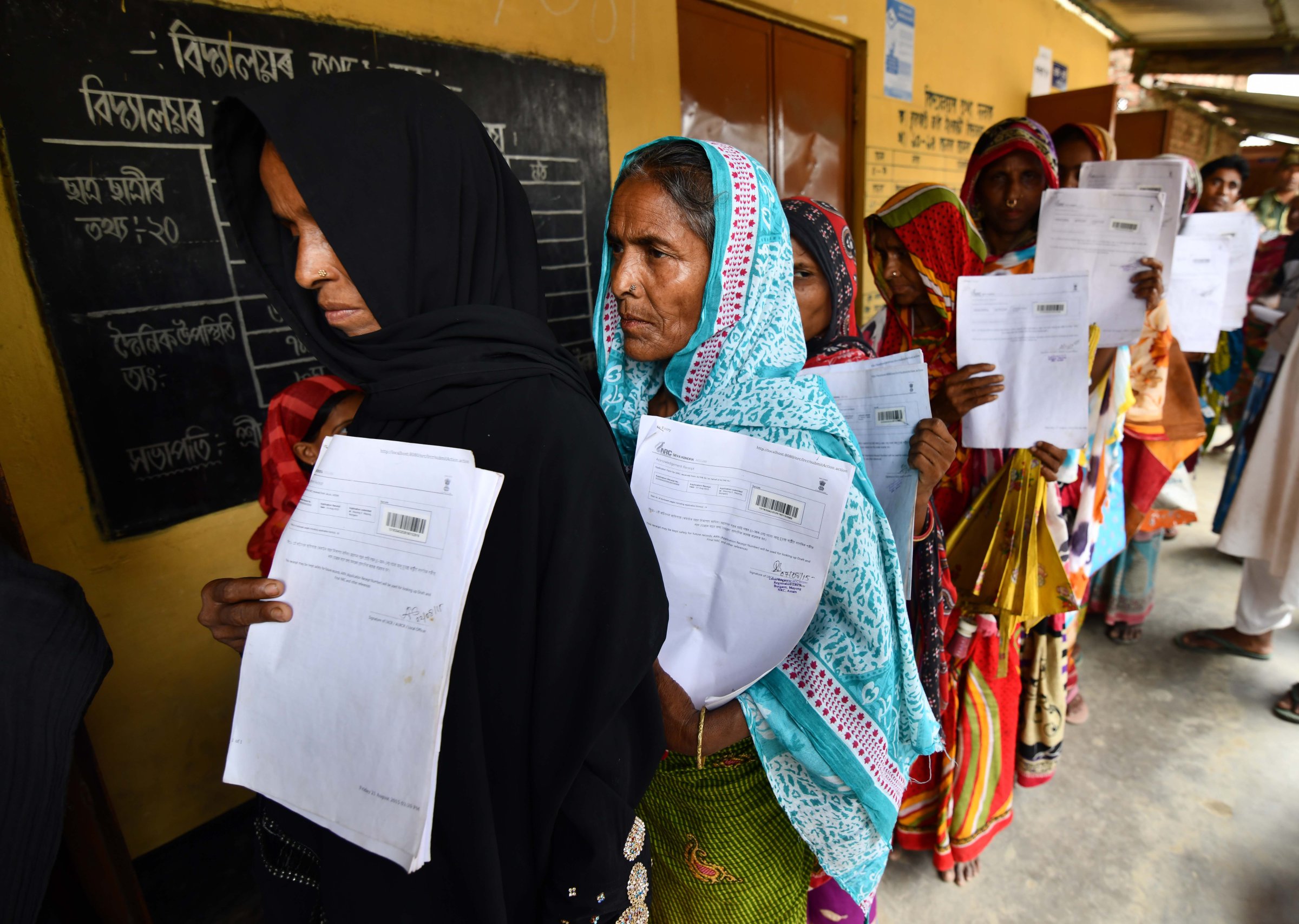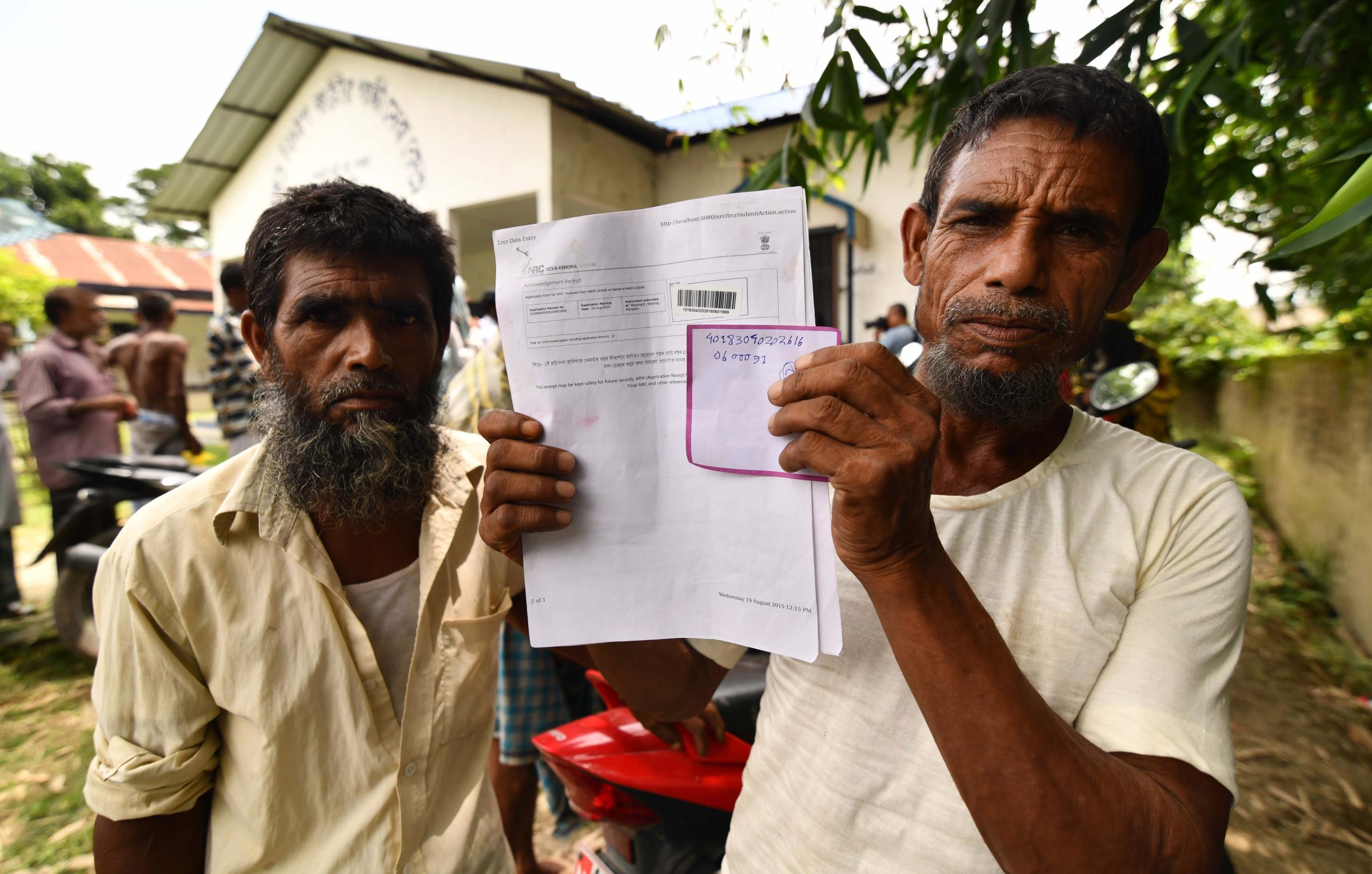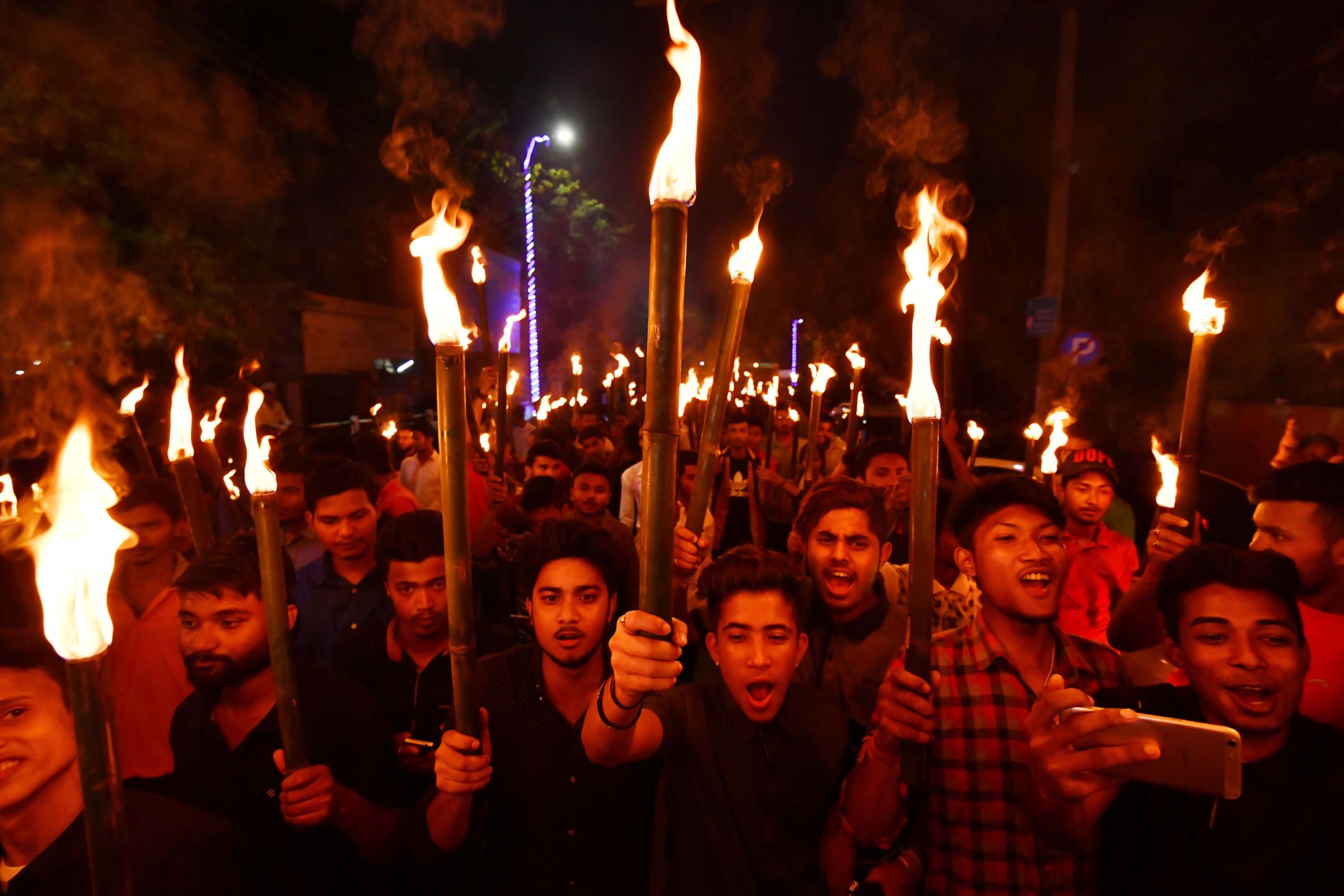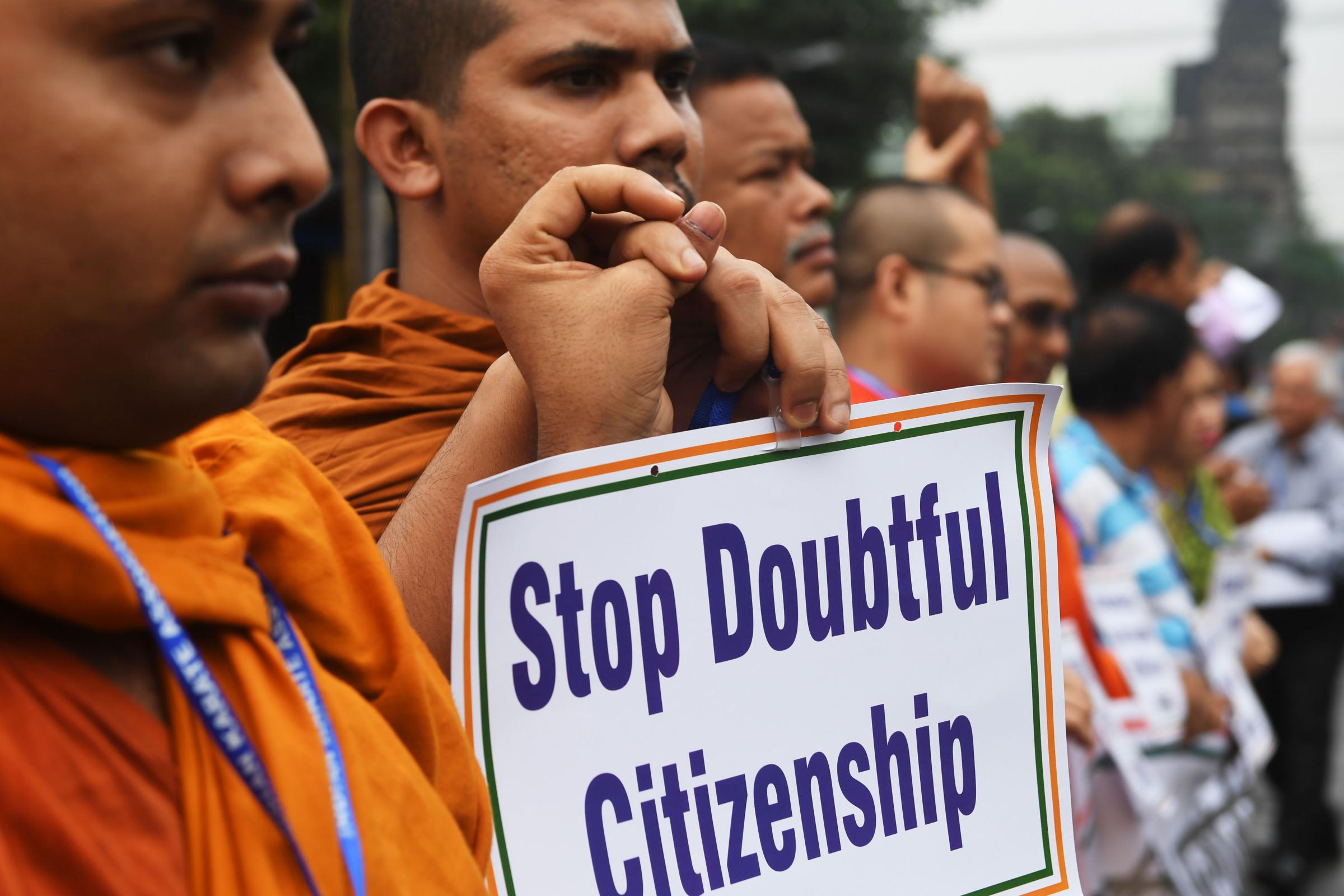
Even before the family introduce themselves by name, they produce a thick file with documents that go back 80 years. “Evidence before conversation,” the youngest son says as he arranges chairs outside his village house for the large family and visitors. “We are Indians. We’ll show you proof.”
Shajahan Ali Ahmed, a 29-year-old social worker, part-time journalist and YouTuber, displays the documents out on a plastic table in the middle of his courtyard. Here are the names of the grandfather, father, mother, and brothers on the electoral lists for decades. Here are tattered land deeds from 1934 issued in the sweeping cursive of a British colonial bureaucrat. Here—laminated with pride—is Shajahan’s college certificate. Sisters’ birth certificates. Brothers’ school admission cards. Driving licenses. Paperwork tracing the lifetime of an Indian family.
And yet, nearly every member of Shajahan’s family is on the brink of losing his or her Indian citizenship—along with 4 million other people in the northeastern state of Assam, excluded from a draft list of citizens released by the Indian government on July 30. “I’m not even sure what that would mean,” says Shajahan’s older brother Humayun Islam, a vegetable vendor. “What would it be to not be Indian?”
The diverse state of Assam, one of India’s main tea-growing areas, is the doorway to northeast India. It borders Bangladesh and in this state alone, there is a list called the National Register of Citizens (NRC). First made in 1951, the government began updating it in 2015.
The citizenship drive in Assam is the biggest of its kind in India, and perhaps the world. Nearly 33 million people here have been trying to prove that they, or their ancestors, were in the state before March 24, 1971, one day before the Bangladesh War of Independence began. Conceived of by other parties, but now led by the ruling Hindu nationalist Bharatiya Janata Party (BJP), the update of the citizens list is an attempt to detect undocumented immigrants. Those on the list are deemed genuine Indian citizens, under conditions more stringent than the rest of India.
For three years, millions of people have been submitting dog-eared, yellowing land and identity documents in Assamese, Bengali and English. They logged online to access digitised census back-data that goes back over 60 years. Households have had to trace their ancestors, find paperwork linking them, and submit intricate family trees listing siblings and grandchildren over four generations. NRC officials conducted more than 900,000 hearings with large families to identify, and thus verify, each other as descendants of the same ancestor.
The process was expected to finally settle the issue of migrants from Bangladesh. But in the process, the NRC has brought to the fore some of Assam’s deepest social divides—exacerbated by the religious rhetoric of the current Hindu majoritarian ruling party. The mammoth bureaucratic exercise now risks pushing millions to statelessness.

On July 30, officials released the list of citizens at a press conference and sang the Assamese state anthem along with local journalists, heads held high. Twelve percent of applicants didn’t make the cut. The NRC does not provide a demographic breakdown, but within a week, it was clear that most of those excluded were Bengali-speakers, both Hindus and Muslims. (There are Bengali speaking communities on both sides of the border.) The Indian Minister for Home Affairs said people would be able to appeal their exclusion. No one would be subject to punitive action, detention or deportation, he added — at least not yet.
Other countries’ attempts to redefine what constitutes nationhood have created controversy. When the Dominican Republic in 2013 retroactively stripped 200,000 persons of Haitian descent of their Dominican nationality, the Inter-American Court of Human Rights said it was arbitrary and in violation of international treaties to target persons of a certain descent and make the migratory status of parents a condition for nationality.Meanwhile, the debate around citizenship for DREAMers revolves around how undocumented immigrants brought to the U.S. as children should be treated.
In India, too, this register has polarized debate in Assam state and across the country. But few questions have been asked about the fundamental idea of stripping the nationality of a people half a century after they laid roots in India, and of generations who have spent their entire lives there. Not only does India have no treaty with Bangladesh about returning the millions of “illegals” Assam says it will weed out, but it also has no clear plan to deal with future migration from the porous border, except for strengthening vigilance.
Though monitored by the highest court of India, Assam’s exercise has received criticism. Human rights groups see parallels to nearby Myanmar stripping the Rohingya of nationality, claiming they were migrants from Bangladesh. They fear the NRC sets India on a similar path.“Assam has long sought to preserve its ethnic identity, but rendering millions of people stateless is not the answer,” said Meenakshi Ganguly, South Asia director at Human Rights Watch.
Officials in Assam vehemently reject such comparisons. But in the state today, the average Assamese will conflate local and immigrant Bengalis, and speak of them“taking over.” They will speak about protecting Assamese identity with an urgency that reveals a history of deep tensions. It’s why Bengali Muslims like Shahjahan grow up with the fear of being seen as a “foreigner”; it’s why his family carefully preserves a shelf-full of paperwork.

As borders in this region were drawn and redrawn over a century—creating East Bengal, then East Pakistan, and finally Bangladesh—Assamese and Bengali relations gradually soured. The resentment first began when the British colonialists wooed Bengalis through land and jobs to a region with largely Bodo tribes and Assamese-speakers. Different groups clashed over limited resources, and cultural and linguistic primacy.
Eventually, it became a question of who has the right to Assam, and to India. Riots and state-run anti-immigration programs by various parties, including the Indian National Congress, have often targeted Bengali-speaking Muslims and Hindus who have lived in the region for generations.Violence reached its peak during a six-year anti-outsider agitation in the ‘80s, known as the Nellie Massacre. Machete-wielding Assamese youth killed 2,191 “suspected immigrants”—all descendants of migrated Bengali Muslims—in one February morning.
More recently, there is palpable alarm about the growing Muslim population—rising from 28 to 34 percent of the state population from 1991 to 2011, according to the last census. (Some experts ascribe this to higher birth rates among illiterate and poor Muslims, rather than to illegal migration from Bangladesh.)
Many Indians have praised Prime Minister Narendra Modi’s party for updating the NRC. The federal and state governments budgeted $175 million for the policy, which was a crucial plank leading to the BJP’s victory for the first time in Assam in 2016. Initially, it was widely believed that those left off the list would be immediately deported; in late July, the federal government even approved funds for a detention camp, saying the six temporary ones are getting overcrowded.
But opposition figures across in India have criticized the NRC for bureaucratic gaffes and possible discrimination against Bengali-speaking locals. Four Special Rapporteurs of the United Nations have expressed serious concerns about potential “wrongful exclusion.”Amnesty International asked that families not be “torn apart,” and the rights of those at risk of becoming stateless not be violated. Now, as some BJP politicians demand prompt expulsion and others assure a fair process, it’s unclear what exactly will happen to those who fail to reclaim their citizenship when the process is finally complete.
They may have to face opaque and corrupt Foreigners Tribunals, run by the state’s Home department, before they are thrown in detention camps. In 2013, Ainul Hoque, 40, was declared Indian by a tribunal but two years later, was questioned over his status again by the police—he faces trial again. As a result, he and his children have been excluded from the NRC. “How many times should I prove I’m Indian?” Hoque asks, slapping his forehead with a stack of documents. A rice farmer in Assam’s river islands, Hoque has a birth certificate showing we was born in India. Floods and erosion have displaced his family eight times. “I accept nature’s fury, and god’s wrath,” he says. “But I don’t know what to do when my own country wants to throw me out.”

The registry seeks to be neutral, but it is saddled with Assam’s identity wars. Village-level officials undertaking the NRC have been accused of acting on their own biases. Hasina Ahmed, a 28-year-old woman from Alipur Char village, said an official rejected the village link certificate she submitted as proof of lineage. “He said it looked fake,” she says. Subsequently, a higher official cleared it as authentic. The NRC village offices allowed Assamese women to submit the same document with no verification. “They’re original inhabitants,” an official in Barpeta explains to TIME, citing a category that no longer officially exists.
The state’s ruling Hindu nationalist BJP government is also trying to infuse the local desire to expel foreigners with its own anti-Muslim agenda. In 2016, it tried to amend laws in parliament to relax citizenship requirements for only non-Muslim migrants from neighboring countries including Bangladesh. Assam erupted in protest against it. “We have no religious bias. We don’t want Bengali Hindu immigrants either,” says former chief minister Prafulla Kumar Mahanta, leader of the Assamese nationalist Asom Gana Parishad, an ally of the BJP government in Assam.
Assamese society largely supports the NRC, but are sharply divided on whether it is fair. Despite the longstanding tensions, most people here criticize the idea of driving out Muslims. At the same time, they believe the changes migration has wrought in the region must be reversed in some way.
Today, as people excluded get ready to appeal to the NRC, Assamese nationalist groups are beginning a new fight. “We have estimated that there are 5 million illegals,” says Palash Changmai, the general secretary of an influential Assamese students union, mentioning an unsubstantiated number popularly quoted in anti-foreigner rhetoric. “The list has excluded only 4 million. Where are the rest? We know where they are.”
Self-appointed border-guards in neighboring Meghalaya and West Bengal are randomly stopping people at state borders, claiming to prevent an influx of the declared foreigners. Undeterred by the NRC’s flaws, some groups of Indian nationalists are demanding such an exercise for the entire country to root out “infiltrators.” This would put millions in India under risk of losing their nationality, like the Rohingya did in Myanmar, or face perpetual harassment in the name of citizenship.
Even with the NRC list, all sides remain anxious. But the stakes are highest for those finally excluded. They face a bleak limbo in detention camps. It could uproot tens of thousands, and split up families. Anita Barman, a 49-year-old Bengali Hindu teacher who did not make the list, has little hope for the appeals process. “What will they do with us in the end?” she asks in frustration. “Drown us in the sea? Send us to a country I have not even seen in my imagination? Leave us at the border with nothing?”
More Must-Reads from TIME
- Why Biden Dropped Out
- Ukraine’s Plan to Survive Trump
- The Rise of a New Kind of Parenting Guru
- The Chaos and Commotion of the RNC in Photos
- Why We All Have a Stake in Twisters’ Success
- 8 Eating Habits That Actually Improve Your Sleep
- Welcome to the Noah Lyles Olympics
- Get Our Paris Olympics Newsletter in Your Inbox
Contact us at letters@time.com